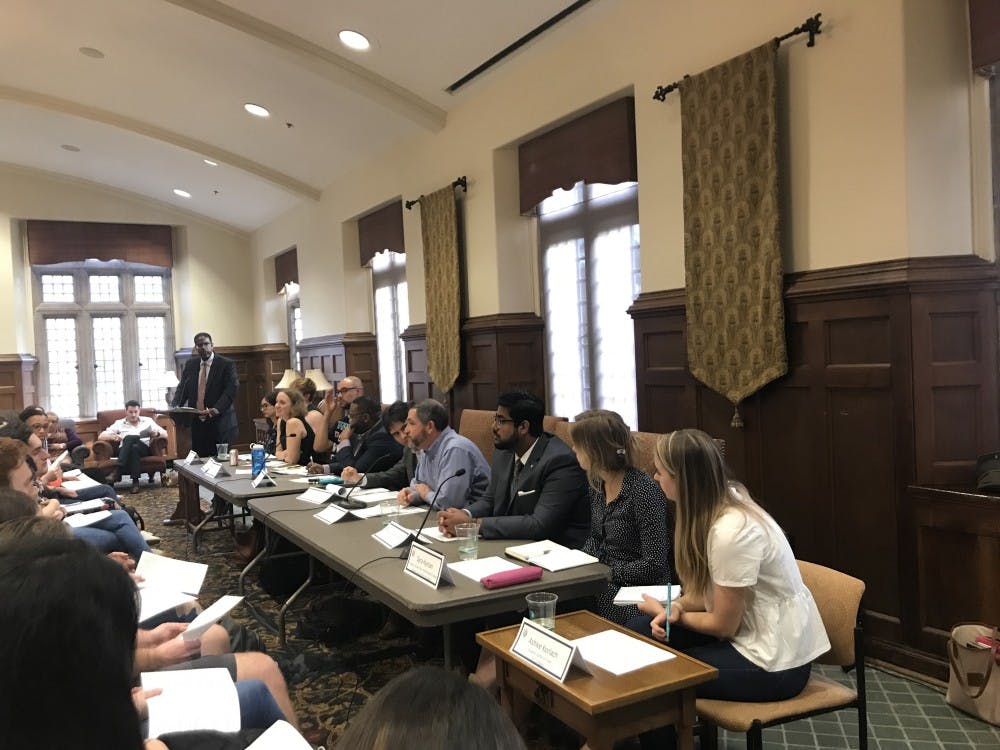Editor's note: Ashlee Korlach, editor-in-chief of The Collegian, was featured on the panel. Alec Greven is the Richmond College Student Government Association secretary, but the views expressed in this article are his own.
Voices representing various viewpoints openly discussed and debated free speech at the University of Richmond at the town hall panel Got Voice? on Tuesday, Feb. 5 in the Brown-Alley Room in Weinstein Hall.
Jane Berry, University Faculty Senate president and professor of psychology, created the 10-panelist event, with the help of the President's Office, in the wake of the Senate's decision to withdraw a motion drafted in response to sophomore Alec Greven's Free Expression Resolution, she said.
The panel was moderated by Henry Chambers Jr., professor of law.
Greven was initially disappointed when the Senate withdrew the motion, but was pleased to hear about the forum.
“What is heartening is that they are forming this forum and at least they are going to have some conversations about it,” Greven said in an interview before Tuesday's panel. “While I wish they would do more to take an active role to address and promote this initiative that students have asked for, I’m glad that they are actually taking what appears to be some steps in that direction."
The panelists included Kay Dervishi, managing editor of Forum Magazine; David Forsyth, a student at the T.C. Williams School of Law; Jessica Flanigan, associate professor of leadership studies and PPEL; Eric Grollman, assistant professor of sociology; Lee Dyer, associate director for LGBTQ campus life; Javier Hidalgo, associate professor of leadership studies; Tom Mullen, director of public affairs journalism and director of Catholic life; Aquila Maliyekkal, the Senate speaker for RCSGA; Sara Hyman, Senate chair for Westhampton College Government Association and Ashlee Korlach, editor-in-chief of The Collegian.
Dyer, Grollman and Forsyth mostly talked about marginalized voices during the panel, whereas Flanigan, Mullen and Maliyekkal spoke about their desire to protect free speech.
Flanigan connected free expression with the pursuit of truth.
“Truth is unavoidable whatever our values are,” she said. “The question is: What should our values be?”
Maliyekkal believes it is possible for people to learn from hate speech, he said. Grollman disagreed with most of what Maliyekkal and Flanigan said on the panel.
Enjoy what you're reading?
Signup for our newsletter
“If you are silent about your pain, they will kill you and say you enjoy it,” Grollman said, quoting Zora Hurston, an author of African-American literature and anthropologist.
There are students who do not feel safe on campus, Grollman said. In their classes they have “marginalized students” who they do not think feel powerful enough to openly oppose or argue against people with differing viewpoints, they said.
Hidalgo questioned the policy that the university currently maintains.
“What is our speech code?” Hidalgo said in his opening statement. “So we have a speech code, we can see it online … but I actually have no clue what it means.”
Berry had hoped that the event would help uncover whether there was common ground on the questions circulating campus regarding freedom of expression, she said. After the event, Berry said she had wanted to hear more people speak.
Glyn Hughes, director of Common Ground, helped Berry plan the event. The panel seemed to really accomplish what they and Berry wanted it to, Hughes said afterward.
“In the end, it’s not the law that saves us,” Hughes said when asked if they supports a policy on freedom of expression. “It’s how we do community as a verb.”
The next step after the panel is to analyze the current policies to see what the impact on free speech and minority students is, Noah Sachs, professor of law, said.
The university needs to protect constitutionally protected speech, Greven said.
“If we hear things that we disagree with, we are not going to censor it, but we are going to actively challenge it, we are going to try to refute it, show why it’s wrong and why we disagree and further that dialogue," Greven said before the event.
On Tuesday, Feb. 12, Robert Zimmer, president of the University of Chicago, will speak about Freedom of Expression on Campus as part of the Sharp Viewpoint Speaker Series.
The Faculty Senate, along with the President's Office, is planning to host a series of events throughout the spring semester to better understand the viewpoints of people regarding freedom of expression, Berry said.
Contact news writer Victoria Davis at victoria.davis@richmond.edu.
Support independent student media
You can make a tax-deductible donation by clicking the button below, which takes you to our secure PayPal account. The page is set up to receive contributions in whatever amount you designate. We look forward to using the money we raise to further our mission of providing honest and accurate information to students, faculty, staff, alumni and others in the general public.
Donate Now



